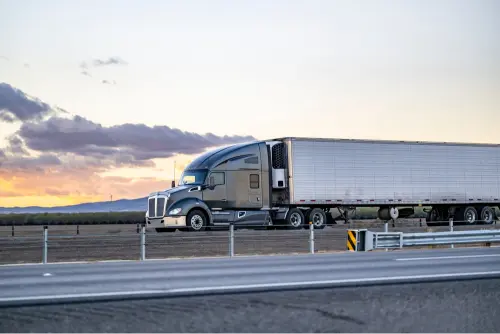What Is Interstate Trucking
Interstate trucking refers to the operation of commercial motor vehicles (CMVs) across state lines or international borders. A key understanding in the trucking industry involves the distinctions between interstate and intrastate trucking. This includes transporting goods or passengers from one state to another or between the United States and a foreign country, such as Mexico or Canada.
Even if a shipment starts and ends within the same state, it may still be considered interstate if the cargo’s origin or destination is outside the state. Interstate trucking is subject to federal regulation and oversight by the U.S. Department of Transportation (DOT) and the Federal Motor Carrier Safety Administration (FMCSA). Your Houston truck accident attorney will learn whether the trucking company is an interstate or intrastate carrier.
To legally operate interstate, trucking companies must obtain a U.S. DOT number and a Motor Carrier (MC) number. These registrations authorize the carrier to cross state lines and ensure compliance with federal safety, financial responsibility, and insurance standards. Carriers engaged in interstate commerce must also follow strict rules regarding hours of service, electronic logging devices (ELDs), drug and alcohol testing, and equipment inspections.
What Is Intrastate Trucking
Intrastate trucking involves the transportation of goods or passengers exclusively within a single state. This means that the entire haul begins and ends within one state, and the cargo does not cross state lines. While intrastate carriers do not need federal authorization to operate, they must comply with state-specific regulations imposed by the state’s Department of Transportation or Public Safety.
Each state establishes its own licensing, insurance, and safety requirements for intrastate carriers. These requirements may mirror or differ from federal rules, depending on the jurisdiction. For example, while the FMCSA requires a minimum of $750,000 in liability coverage for interstate carriers transporting non-hazardous freight, a state may impose a different standard for intrastate operations. Carriers engaged in intrastate commerce must ensure compliance with local laws to avoid fines, penalties, or shutdown orders. Texas has largely adopted the Federal Motor Carrier Safety Regulations.
Regulatory Oversight and Governing Authorities
The primary distinction between interstate and intrastate trucking lies in the scope of regulatory oversight. Interstate trucking falls under federal regulation, which ensures uniformity across state lines and enforces compliance through the FMCSA. This includes the application of the following federal safety standards:
- Hours of Service (HOS) regulations to limit driver fatigue
- Drug and alcohol testing programs
- ELD mandates tracking driving time
- Vehicle maintenance and inspection requirements
- Financial responsibility rules, including insurance minimums
In contrast, intrastate carriers are governed by state authorities. While many states adopt parts of the FMCSA rules, others customize them. For instance, Texas enforces similar HOS rules for intrastate drivers but with different applicability thresholds based on vehicle weight and cargo type. States may also issue their vehicle registration requirements, fuel tax rules, and driver qualification standards.
Licensing and Registration Requirements
For interstate trucking, drivers and motor carriers must obtain a U.S. DOT number and, in most cases, an MC number from the FMCSA. These credentials serve as federal identifiers and proof of authorization to transport goods across state lines. Additionally, interstate carriers are required to participate in the Unified Carrier Registration (UCR) program. They may be required to obtain International Registration Plan (IRP) plates and International Fuel Tax Agreement (IFTA) decals to ensure tax compliance.
Intrastate carriers, by contrast, generally do not need a federal MC number but must register with their state’s regulatory agency. Requirements vary by state but typically include:
- A state DOT number
- Vehicle registration with the state’s motor vehicle agency
- Proof of intrastate-only insurance coverage
- Intrastate authority or permit
- Compliance with local tax and fuel programs
Operating without proper credentials can result in severe fines, vehicle impoundment, and service suspension.
Insurance Requirements for Trucking Companies
Interstate motor carriers must carry federally mandated minimum liability insurance, which varies depending on the type of freight:
- $750,000 for non-hazardous materials
- $1,000,000 for oil transport
- $5,000,000 for hazardous materials
These minimums ensure victims of trucking accidents have access to financial compensation. Carriers must file proof of coverage with the FMCSA through forms such as BMC-91 or BMC-91X. Texas has established a minimum coverage requirement of $500,000 for intrastate trucking.
Intrastate carriers must meet the insurance requirements of their respective state. Some states mirror the federal limits, while others impose lower or higher thresholds. States may also require cargo insurance, general liability coverage, or workers’ compensation policies, depending on the nature of the operations and workforce.
Safety and Compliance Standards
Safety compliance is essential for both types of operations, but federal oversight of interstate carriers is more comprehensive. FMCSA conducts roadside inspections, audits, and crash investigations. Violations can result in safety rating downgrades, out-of-service orders, and civil penalties.
Intrastate carriers must comply with safety enforcement at the state level. While the scope of inspections and audits may be narrower, many states have adopted large portions of the FMCSRs into their codes. Carriers operating exclusively within state borders should not assume leniency in enforcement. Local DOT and law enforcement agencies actively monitor compliance.
Common Violations in Interstate and Intrastate Operations
Frequent violations for interstate carriers include:
- Exceeding hours-of-service limits
- Failing to maintain accurate ELD logs
- Operating without proper MC authority
- Insufficient insurance coverage
- Equipment maintenance violations
For intrastate carriers, violations often include:
- Lack of state registration or an intrastate permit
- Inadequate driver qualification files
- Expired medical certificates
- Improper vehicle markings
- Failure to meet minimum state insurance requirements
Both types of carriers face serious legal and financial consequences for noncompliance.

Legal Implications After a Trucking Accident
Truck accidents involving interstate carriers often trigger federal investigations, especially if fatalities or hazardous materials are involved. Victims may pursue compensation under federal and state personal injury laws. The existence of FMCSA regulations enables attorneys to establish negligence when a federal safety rule has been violated, and the violation was a cause of the accident.
For intrastate trucking accidents, claims are typically governed by state law; however, state safety violations can play a similar role in establishing fault. Determining whether a carrier is operating interstate or intrastate can impact the evidence, expert testimony, minimum liability coverage, and applicable standards in a lawsuit. Always contact a qualified truck accident attorney after an injury accident.
Determining Whether a Carrier Is Interstate or Intrastate
Key factors that determine a carrier’s classification include:
- The origin and final destination of the cargo
- The intent of shipment (even if temporarily stored in-state)
- The carrier’s registration and operating authority
- Contracts showing transport across state or national boundaries
The classification is not based solely on the truck’s movement. Even carriers that never physically cross state lines can be considered interstate if the cargo is part of a continuous shipment that originates from or is destined to another state.
Why the Distinction Matters for Shippers and Carriers
For shippers, using an authorized interstate carrier ensures federal oversight and broad insurance protections. It also allows for seamless logistics across jurisdictions. For carriers, the decision to operate interstate or intrastate affects their cost structure, compliance burdens, insurance premiums, and operational flexibility.
Failing to classify operations correctly can expose a company to penalties, litigation, and denial of insurance coverage. Carriers must conduct a compliance audit before launching operations to avoid misclassification.
Contact the Truck Accident Lawyers at Baumgartner Law Firm for Help With Accidents With Commercial Vehicles
Our experienced truck accident attorney has over 40 years of experience and handles 18-wheeler and semi-truck cases across the state.
Contact the Houston personal injury law firm of Baumgartner Law Firm at (281) 587-1111.
Baumgartner Law Firm
6711 Cypress Creek Pkwy
Houston, TX, 77069
Visit Our Law Firm in Houston
Related Resources:













